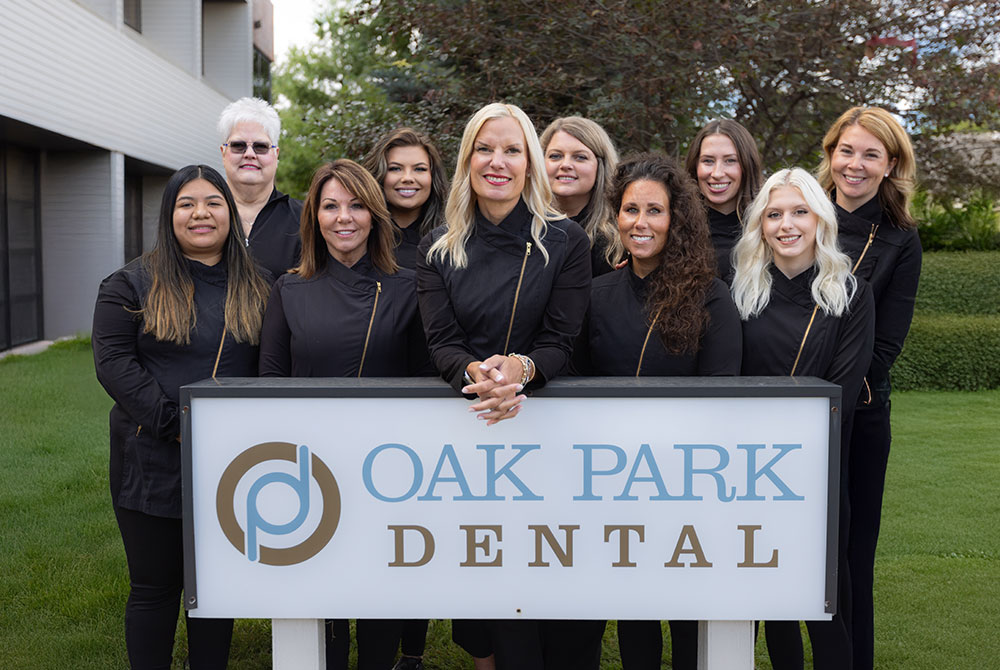The more compressed the jaw is, the more further back the jaw is, the more inflammation in the joint, more likely to have clicking and popping and things like that that can be very painful. You can end up wearing down that joint and be bone-on-bone, have joint degeneration. Minimally, we talk about doing a neuromuscular orthotic, which is an appliance that we make them, we hook them up to a jaw-tracking computer on an EMG machine where we measure muscle activity. So we’re able to find out where their jaw is most comfortable in six planes. So three dimensions, in six planes. So then we can give them that orthotic. Many people will wear that all day. Some will just wear it at night, try to like function without having it in their mouth, because they might feel like it’s cumbersome but then they wear it at night. Many people wear the orthotic during the day, and we make them a sleep appliance at night. So it’s holding their jaw in that same position, but it’s holding them forward. Many times when you sleep, if you’re on your back, your jaw falls back, and you’re more prone to snoring. So it’s really nice to be able to wear that sleep appliance at night.
Save Smiles With Neuromuscular Orthodontics in Madison
Neuromuscular orthodontics in Madison, WI, as practiced by Dr. Gyurina, addresses the complex relationship between hard and soft tissues in the mouth, focusing on jaw alignment and its impact on overall health. Addressing misalignment can:
- Relieve jaw pain
- Ease neck and shoulder discomfort
- Lessen the frequency and intensity of headaches
- Eliminate a “frozen” jaw and popping sounds
Call 608-351-0192 to schedule your consultation with Dr. Gyurina. Discover how we can help restore your oral health and overall well-being.
Diagnose Your Condition & Find Solutions for Your Symptoms
This approach recognizes the importance of muscles as power sources, nerves as control mechanisms, and proper jaw alignment. Dr. Gyurina uses state-of-the-art technology to determine if your symptoms are caused by malocclusion and if so, what your optimal jaw position is. Computerized jaw tracking instruments record your jaw movement, resting position, and path of closure. Electromyography measures your jaw’s muscle function in both its stressed and relaxed positions. It will also measure the jaw-to-skull relationship to see if there is a structural imbalance. Sonography is used to record jaw joint sounds to detect any abnormalities. Additionally, X-rays of the jaw may be taken to help evaluate the condition and positioning of the joint.
Once you have been diagnosed with TMJ, you can start treatment using neuromuscular dentistry. Dr. Gyurina will determine the best course of treatment for your specific needs. Your care is likely to follow these steps:
- Relieve Pain – Dr. Gyurina will devise a strategy to relieve your pain. Options will be based on your individual needs and her extensive experience treating TMJ pain.
- Stabilize Your Bite – Dr. Gyurina will create an orthotic that will be used to stabilize your bite. Once symptoms are relieved and the jaw is in the correct position, you’ll move onto long-term solutions.
- Long Term Solutions – Options include smoothing and shaping the teeth for a proper bite, fitting you for partials or crowns, smile reconstruction, or orthodontic treatment.
Call 608-351-0192 or request an appointment online if you want to get the benefits of neuromuscular orthodontics in Madison, WI.
Neuromuscular orthodontics is a holistic approach that focuses on aligning the jaw, teeth, and muscles to achieve optimal function and appearance. It considers the entire masticatory system, including jaw position, muscle function, and tooth alignment. This approach aims to resolve issues like TMJ disorders, headaches, and bite problems by addressing the underlying neuromuscular imbalances.
Neuromuscular orthodontics aids TMJ treatment by addressing the root causes of temporomandibular joint disorders. It focuses on optimizing jaw alignment and muscle function to relieve stress on the TMJ. Techniques like TENS therapy help relax tense muscles, while jaw tracking devices identify ideal jaw positions. Custom orthotic appliances then guide the jaw into this corrected position, reducing pain and improving function.
Neuromuscular orthodontics can benefit individuals experiencing chronic headaches, jaw pain, neck or back discomfort, tinnitus, chewing difficulties, teeth grinding, uneven bite, sleep apnea, postural problems, or unexplained tooth wear. It’s particularly useful for those who haven’t found relief through traditional dental or orthodontic treatments.

